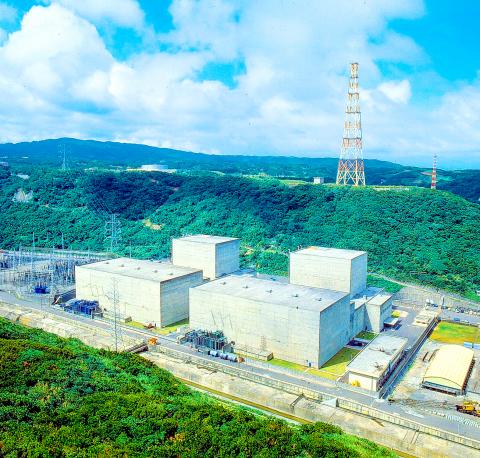The Atomic Energy Council (AEC) yesterday issued a permit to state-run Taiwan Power Co (Taipower) to decommission the Jinshan Nuclear Power Plant over a 25-year period, council official Kao Pin (高斌) said, adding that storage of used fuel rods remains a major challenge.
Built in New Taipei City’s Shihmen District (石門) in the 1970s, Taiwan’s first nuclear power plant, it has two reactors with an installed capacity of 636 megawatts each, information on Taipower’s Web site showed.
The 40-year operation permit for the plant’s No. 1 reactor expired on Dec. 5 last year, but it has not operated since 2014 due to a problem with reactor components, Kao said.

Photo courtesy of Taiwan Power Co
The 40-year permit for its No. 2 reactor is to expire on Monday, although it, too, has not been in operation since a power transmission tower collapsed due to heavy rain in June 2017, he said.
After Taipower’s decommissioning plan last week obtained environmental impact assessment approval from the Environmental Protection Administration (EPA), the council yesterday issued the permit, which is to take effect on Tuesday, he said.
The utility is required to finish decommissioning the plant within 25 years, while its priority is to remove 816 used fuel rods from the two reactors, he said.
The plant’s two pools for spent fuel rods have a capacity of 3,083 fuel rods each and currently contain 3,074 and 3,076 rods from the two reactors, he said.
Although the utility has built a dry-storage site for spent rods, the New Taipei City Government has been reluctant to issue a water and soil conservation permit for it, one of the sticking points in the EIA process.
Taipower has to obtain the water and soil conservation permit, otherwise it would not be able to remove the fuel rods from the reactors, Kao said.
Operating permits for the two reactors at the Guosheng Nuclear Power Plant in New Taipei City’s Wanli District (萬里) are to expire on Dec. 27, 2021, and March 14, 2023.
The utility’s proposal for decommissioning the Guosheng plant’s reactors is being reviewed by the council and the EPA, Kao said.
The nation’s nuclear energy is generated by four reactors at the Guosheng plant and the Ma-anshan Nuclear Power Plant in Pingtung County, making up about 11.6 percent of the national total, Taipower’s Web site showed.

POSITIVE DEVELOPMENT: Japan and the US are expected to hold in-depth discussions on Taiwan-related issues during the meeting next month, Japanese sources said The holding of a Japan-US leaders’ meeting ahead of US President Donald Trump’s visit to China is positive news for Taiwan, former Japan-Taiwan Exchange Association representative Hiroyasu Izumi said yesterday. After the Liberal Democratic Party’s landslide victory in Japan’s House of Representatives election, Japanese Prime Minister Sanae Takaichi is scheduled to visit the US next month, where she is to meet with Trump ahead of the US president’s planned visit to China from March 31 to April 2 for a meeting with Chinese President Xi Jinping (習近平). Japan and the US are expected to hold in-depth discussions on Taiwan-related issues during the

‘LIKE-MINDED PARTNER’: Tako van Popta said it would be inappropriate to delay signing the deal with Taiwan because of China, adding he would promote the issue Canadian senators have stressed Taiwan’s importance for international trade and expressed enthusiasm for ensuring the Taiwan-Canada trade cooperation framework agreement is implemented this year. Representative to Canada Harry Tseng (曾厚仁) in an interview with the Central News Agency (CNA) said he was increasingly uneasy about Ottawa’s delays in signing the agreement, especially as Ottawa has warmed toward Beijing. There are “no negotiations left. Not only [is it] initialed, we have three versions of the text ready: English, French and Mandarin,” Tseng said. “That tells you how close we are to the final signature.” Tseng said that he hoped Canadian Prime Minister Mark Carney

President William Lai (賴清德) yesterday bestowed one of Taiwan’s highest honors on Saint Vincent and the Grenadines (SVG) Ambassador Andrea Clare Bowman in recognition of her contributions to bilateral ties. “By conferring the Order of Brilliant Star with Grand Cordon on Ambassador Bowman today, I want to sincerely thank her, on behalf of the Taiwanese people, for her outstanding contribution to deepening diplomatic ties between Taiwan and SVG,” Lai said at a ceremony held at the Presidential Office in Taipei. He noted that Bowman became SVG’s first ambassador to Taiwan in 2019 and

A man walks past elementary school artworks at the Taipei Lantern Festival in Ximen District yesterday, the first day of the event. The festival is to run from 5pm to 10pm through March 15.